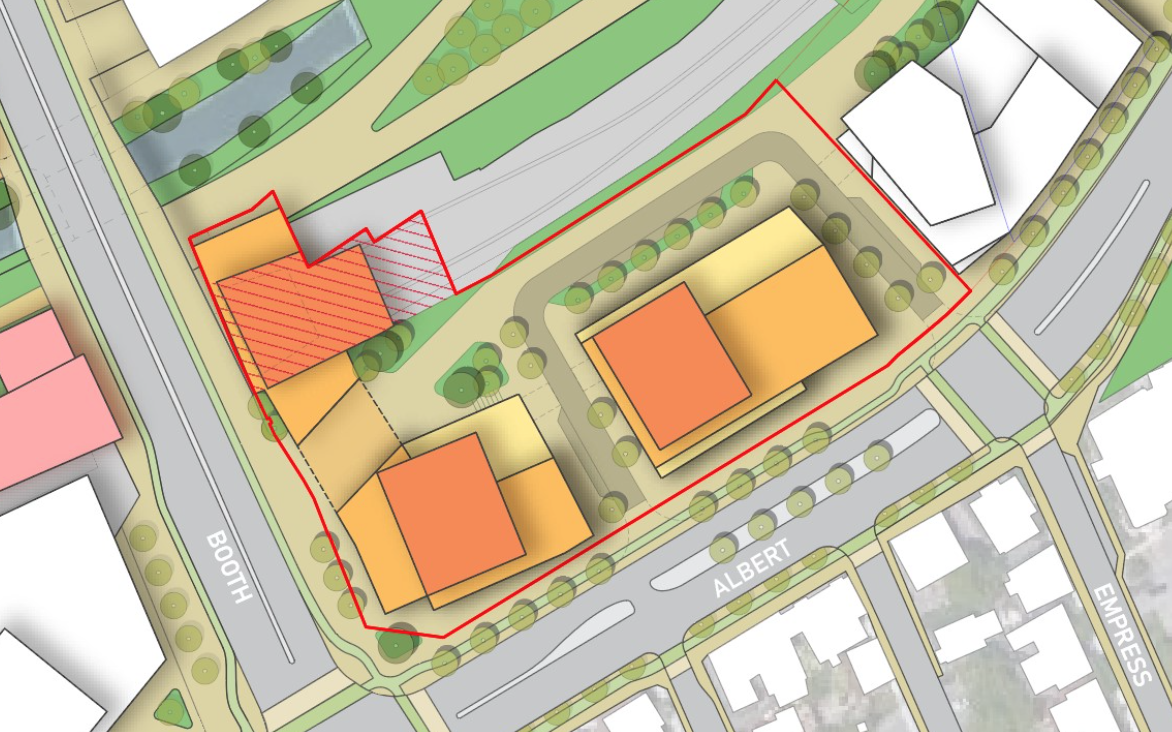The National Capital Commission released a shortlist of three proponents looking to develop an initial parcel of land at LeBreton Flats at its board meeting Thursday, with some groups looking to include community support and affordable housing in their plans from the get-go.

Rather than open up the 29 hectares of federally-owned land west of Ottawa’s downtown core to a single developer group — a tact that’s failed for the NCC in the past — the Crown corporation is assembling the project in stages, with the first piece of prime real estate dubbed the “library parcel” for its proximity to the future site of the city’s forthcoming central library.

Here are the three shortlisted proponents to develop the 1.1-hectare site at 665 Albert St.:
- Dream LeBreton, comprised of Dream Asset Management Corporation, Dream Impact Master LP, KPMB Architects, Perkins & Will, Two Row Architects, Purpose Building, PFS Studio, Ellis Don and Innovation Seven;
- One Planet Living LeBreton, comprised of Windmill Development Group, Epic Investment Services, Centretown Citizens Ottawa Corporation, Diamond Schmidt Architects, DTAH Landscape Architects and Ledcor Projects Eastern;
- Team Central, comprised of Trinity Development Group, Hobin Architecture, Morley Hoppner, Ottawa Community Housing and the Good Companions Senior Centre.
In addition to traditional partnerships between developers, architects and construction firms, the consortiums have added community groups, affordable housing providers and Indigenous consultation leads to the mix.
Whichever group is ultimately chosen in early 2022 to develop the library parcel, NCC chief executive Tobi Nussbaum said Thursday he believes the initial project will “set the tone” for the rest of the LeBreton Flats community.
“We are seeing the elaboration of a plan that we think is going to have real resilience going forward,” he said.
Katie Paris, NCC’s project lead on LeBreton Flats, outlined the proposed master plan for the project at Thursday’s board meeting, speaking to themes of sustainability, affordability and inclusivity.

Get daily National news
The NCC is in the midst of developing a new chapter for its plan that will guide its partnerships with Algonquin nations on the unceded land, she said.
When the LeBreton project is fully built out, the NCC is targeting that 25 per cent of all units will be affordable housing with full-sized family units in the mix.
While not every parcel will necessarily meet that mark, the initial library parcel is set to start the project with a minimum of 180 affordable units out of the expected 600 total homes on the lot. These roughly 30 per cent of the total units will be priced at 80 per cent of market rents for the ensuing 25 years, Paris said.
The NCC is partnering with the Canada Mortgage and Housing Corporation and is leaning on the agency’s Federal Lands Initiative to fund the affordable housing elements.
All buildings as part of the LeBreton project will also require energy sources with net-zero carbon emissions.
Both the LeBreton Flats master concept plan and library parcel project were lauded by the NCC board on Thursday.
Board member Michael Foderick called the approach “capital planning at its finest” during the meeting and noted that the approach to divide up the large piece of land into parcels is what allows smaller players to get a hand in such a large city-building project.
“That is a success that shouldn’t go unnoticed,” he said. “The business model here is already bearing fruit.”
Nussbaum said the NCC team is working “underneath the radar” to get other parcels ready for tender in the months ahead.

Ottawa, Gatineau mayors disagree on new NCC transit group in budget
One topic of discussion at Thursday’s board meeting was this week’s federal budget, which drew mixed approvals from mayors on either side of the Ottawa River.
The Liberal Government’s 2021 budget included mention of two new groups overseeing projects in the Nation Capital Region: one, housed in Public Services and Procurement Canada, would study the demand for a sixth interprovincial crossing between Ottawa and Gatineau; the other, within the NCC, would bring together federal stakeholders on a proposed tram system to streamline cross-river commutes.
Gatineau Mayor Maxime Pedneaud-Jobin said Thursday that, in addition to money set aside in the budget for public transit projects, the budget’s creation of an NCC public transit office is a “clear signal” from the feds that they’re keen to move forward with the tram.
“This opportunity to bring everyone together at the federal level is a necessity, really,” Pedneaud-Jobin said in French. “It was one of the dangers of this project, there are so many stakeholders.”
But his counterpart in Ottawa was not as keen on the new offices proposed in the federal budget.
“My good friend Maxime and I have a difference of opinion on those two offices that have been set up,” Mayor Jim Watson said.
Pointing out that there were no dollar figures attached to the PSPC and NCC offices established in the budget, Watson said he would prefer to see firm funding commitments for the tram and phase 3 of light-rail transit in Ottawa. He also reiterated his opposition to an additional bridge crossing the Ottawa River.
Nussbaum said in a press conference after the board meeting on Thursday that the NCC does not have any additional details yet on the offices proposed in the budget or whether any additional funding comes with the mandates.
“We’re reading the same text you are,” he said.



_848x480_1397405763961.jpg?h=article-hero-560-keepratio&w=article-hero-small-keepratio&crop=1&quality=70&strip=all)



Comments
Want to discuss? Please read our Commenting Policy first.